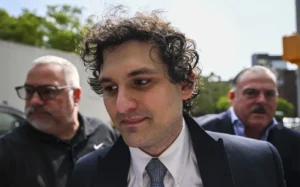
Sam Bankman-Fried, the co-founder and former CEO of cryptocurrency exchange FTX and Alameda Research, received a 25-year prison sentence from Judge Lewis Kaplan of the Southern District of New York, approximately five months after being convicted on all seven charges of fraud and money laundering. Judge Kaplan, with nearly three decades of experience, described Bankman-Fried’s courtroom demeanor as unprecedentedly evasive and dishonest during the proceedings.
The combined maximum penalty for the seven charges, comprising two counts of fraud and five counts of conspiracy, could have reached 110 years. Earlier, the Department of Justice had advocated for a 40- to 50-year prison term, emphasizing the unprecedented magnitude of Bankman-Fried’s financial misconduct, which resulted in at least $10 billion in losses. However, Judge Kaplan considered this suggestion overly harsh. In contrast, Bankman-Fried’s defense had proposed a sentence of 63 to 78 months, highlighting his remorse and charitable actions.
This substantial sentencing follows a thorough five-week trial that scrutinized the downfall of FTX and Alameda Research, previously among the world’s leading crypto platforms, in November 2022. The sentence also aims to deter similar misconduct within the cryptocurrency sector. According to Josh Naftalis, a former federal prosecutor, and Mark Bini, both now in legal practice, this case sets a precedent for future legal actions against fraud in the cryptocurrency industry, signaling a stringent regulatory stance.
In the federal justice system, parole is not an option. However, individuals like Bankman-Fried have the possibility to shorten their sentences through “good time” credits as permitted by the First Step Act, for demonstrating positive behavior during their time in prison, as pointed out by both attorneys. First-time offenders who have not committed violent crimes have several avenues to reduce their sentences, according to Bini. Naftalis highlighted that such behavior could lead to a reduction of up to 15% from the originally sentenced time.
Since being denied bail before his trial, Bankman-Fried has been held at the Metropolitan Detention Center in Brooklyn, New York. This facility has previously housed high-profile detainees such as Ghislaine Maxwell, associated with Jeffrey Epstein, and Martin Shkreli, infamously known as “pharma bro.”
Looking back on SBF and FTX
Before his incarceration, Bankman-Fried was a towering figure in the cryptocurrency sector, associating with stars such as Katy Perry and celebrated athletes like Tom Brady, and securing high-profile sponsorships including the naming rights to the Miami Heat’s arena and branding on major league baseball umpires’ uniforms. FTX, under his leadership, ranked as a leading crypto exchange, trailing only behind giants like Coinbase and Binance in terms of volume.
The platform boasted millions of users prior to its downfall, with revenues skyrocketing from $10 million to $20 million in 2019, then leaping to $80 million in 2020, and surging to $1 billion by 2021. According to Bankman-Fried’s testimony, in 2021, daily revenues reached $3 million.
However, Bankman-Fried’s reputation and credibility rapidly deteriorated within the cryptocurrency community following a report by CoinDesk in November 2022, which exposed concerning discrepancies in Alameda’s financial statements. This revelation triggered widespread alarm over FTX’s financial stability, precipitating the exchange’s bankruptcy filing and Bankman-Fried’s resignation as CEO.
Leading up to and during his trial, it was revealed that the financial mismanagement extended far beyond initial suspicions, with Bankman-Fried and other executives misappropriating over $8 billion of customer funds. Despite Bankman-Fried’s claims during his trial that there was no fraud and that Alameda had merely “borrowed” funds from FTX, the evidence suggested otherwise.
Bankman-Fried’s defense argued that while he might have made poor business decisions, the prosecution exaggerated his culpability, likening their portrayal to a caricature of a villain. Nonetheless, the jury was unconvinced by this defense, focusing on the numerous misleading statements made by Bankman-Fried and the significant financial losses incurred by thousands of FTX investors due to misappropriation of funds without their consent or knowledge.
Consequently, Bankman-Fried is now facing a substantial prison sentence, marking a dramatic fall from grace.















































